|
|
|
Sort Order |
|
|
|
Items / Page
|
|
|
|
|
|
|
| Srl | Item |
| 1 |
ID:
191165


|
|
|
|
|
| Summary/Abstract |
Auctions are currently the dominant and most rapidly expanding form of support for renewable energy project deployment, capturing the interests of policy-makers and academics alike. This article provides a systematic review of the relatively recent but already abundant literature on auctions for renewable energy and proposes a future research agenda on the topic. Major themes, gaps in knowledge, and trends in the literature are highlighted. More research efforts will be needed on the institutional capacity and arrangements, coordination between auctions and other procedures and appropriate inclusion of auctions in policy mixes. The trade-offs between different criteria should be the focus of more rigorous and quantitative marginal analysis, identifying the extent to which improving a given criterion worsens another. The existence, causes and consequences of underbidding, the implications of the just energy transition for the performance of auctions and auction design, the marginal impact of the level of design elements and the interactions between design element choices in “design element packages” merit more attention. There should be a greater focus on the micro-level in the assessment of the success of auctions and auction design. At a methodological level, assessments of auctions with case studies should coexist with more quantitative studies on the topic, using a wide range of methodologies. However, the transferability of lessons on the functioning of design elements across different contexts will be necessarily limited. Finally, a plea is made to national governments and international institutions to facilitate the access to auction data.
|
|
|
|
|
|
|
|
|
|
|
|
|
|
|
|
| 2 |
ID:
191149
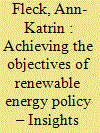

|
|
|
|
|
| Summary/Abstract |
Many countries choose policy objectives around their renewable energy expansion targets, such as efficiency and effectiveness. Due to the different nature and impact of those objectives, not all can be achieved simultaneously, so prioritising objectives is advisable. In this paper, we theoretically analyse the relationship between objectives and show that most European countries with renewable energy auctions in place have defined incoherent policy strategies in their respective renewable energy legislation. Based on these strategies, we analyse which objectives lead to the choice of which auction design elements conducting a qualitative comparative analysis. Considering 269 auction rounds from 20 European countries in the period 2011–2020, not all resulting choices of auction designs are in line with auction theory and existing literature’s findings on the relationship between objectives and auction design. Nevertheless, we show that on a country-level basis, most considered countries choose congruent auction designs, which either support all their (coherent) stated objectives or prioritise one or several of their incoherent objectives. For those countries with an incongruent auction design, we give recommendations on how to adapt their auction design depending on their exact choice of policy objectives.
|
|
|
|
|
|
|
|
|
|
|
|
|
|
|
|
| 3 |
ID:
162944
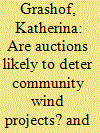

|
|
|
|
|
| Summary/Abstract |
The use of auctions for determining the level of renewable energy remuneration is increasing. A cause for concern is the resulting potential to exclude smaller investors from the market, in particular community energy projects. However, empirical evidence and examination of resulting consequences have been insufficient so far. This article analyses the effects a shift from guaranteed remuneration to auctions might have on incentives to start new community wind projects, analysing the case of Germany. It thus contributes to research on investor-specific impacts of renewable energy policy instruments. An explanatory sequential mixed-method design was applied, combining surveys and interviews for the collection of expert assessments. The developed typology allows the assessment of the respective potential of different wind project types for procedural and distributive justice, which are understood to support local acceptance. Wind projects developed by the local community were found to be most beneficial for local acceptance, but appear to face the highest challenges in auctions. A crowding out of these projects would be particularly unfortunate with regard to the need to expand wind energy capacities much more. It is recommended that policy makers ensure a level playing field, also within the context of auctions, for wind projects developed by the local community.
|
|
|
|
|
|
|
|
|
|
|
|
|
|
|
|
| 4 |
ID:
121316


|
|
|
|
|
| Publication |
2013.
|
| Summary/Abstract |
The anticipated expansion of offshore wind energy in the U.S. has been the subject of considerable legislative effort. The Energy Policy Act (EPAct) of 2005 and the Outer Continental Shelf Lands Act (OSCLA) detail the criteria the federal government must follow when allocating leases for offshore wind farms. The Bureau of Ocean Energy Management (BOEM) provides primary federal oversight to offshore wind in federal waters, and in 2009 they released their formal management guidelines going forward. This research examines lease allocation methods BOEM may use, as well as several promising alternatives, through the lens of the mandated criteria set forth by OSCLA and the EPAct of 2005. We find significant variation between allocation methods in terms of how well they meet each of the criteria. Price-based allocations will have difficulty in meeting criteria while also accounting for the immature status of the offshore wind energy industry. Instead, a multiple factor approach which includes non-monetary considerations may be a more appropriate way to balance federal mandates and industryneeds.
|
|
|
|
|
|
|
|
|
|
|
|
|
|
|
|
| 5 |
ID:
125559


|
|
|
|
|
| Publication |
2013.
|
| Summary/Abstract |
This paper analyzes the pro-competitive effects of financial long-term contracts in oligopolistic electricity markets. This is done in a model that incorporates the main features of the industry: non-storable production, time-varying price-elastic demand, and sequential investment and production decisions. The paper considers contracts for difference that have as reference price the average spot price. Assuming that the spot market coordinator sets competitive prices, the paper shows that installed capacity increases with the quantity of energy contracted, reaching the welfare-maximizing capacity when energy contracted equals this same level. Next, the paper studies the case where the quantity of energy contracted is endogenous and contracts are traded before capacity decisions are taken. Regarding purchasers of contracts, two polar cases are considered: either they are price-taker speculators or they are an aggregation of consumers that auctions a long (buy) contract for a given energy quantity. In the former case the strike price equals the reference price, i.e., arbitrage is perfect, and the quantity of energy contracted falls short of the efficient level. In turn, in the latter case, the strike price equals the average efficient spot price. Moreover, an aggregation of all consumers would choose to auction the social optimum quantity.
|
|
|
|
|
|
|
|
|
|
|
|
|
|
|
|
| 6 |
ID:
176123
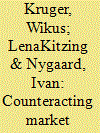

|
|
|
|
|
| Summary/Abstract |
Competitive bidding programmes, or auctions, are becoming the dominant method for procuring utility-scale renewable energy generation capacity and have coincided with significant cost reductions of renewable energy (RE) technologies. The use of price in auctions as the main awarding criterion has been criticized for apparently leading to market concentration and dominance in project ownership. We investigate: to what extent South Africa's renewable energy auction programme has contributed to market concentration and dominance; if market concentration and dominance have a negative impact on electricity cost in the auction; and to what extent measures taken to counteract market concentration and dominance have led to improved competition and diversity of project ownership.
|
|
|
|
|
|
|
|
|
|
|
|
|
|
|
|
| 7 |
ID:
180121


|
|
|
|
|
| Summary/Abstract |
We analyze a drastic price increase in the German auction market for reserve power that did not appear to be driven by increased costs. Studying the market structure and bidding strategies using micro-level bidding data, we find a concentrated market with highly pivotal suppliers in an environment with completely inelastic demand and high entry barriers. We provide descriptive evidence that the price increase was triggered by an abuse of the “guess the clearing price” principle of discriminatory auctions via repeated pretended “bad guessing” of the marginal bid by the most dominant supplier. As intentional “bad guessing” of marginal bids is hard to prove, this suggests that the auction design is crucial for the competition authority's monitoring power – an issue that is often neglected in the discussion on the properties of auction designs. In fact, given regulatory threats, the deemed main advantage of pay-as-bid auctions over uniform price auctions and the popular belief that they reduce dominant suppliers' withholding incentives and diminish their ability to tacitly collude may be questioned in non-static settings. This suggests that pay-as-bid auctions may not necessarily reduce incentives for strategic capacity withholding and collusive behavior, but can even increase them when market power is high and demand inelastic, which is the case in virtually all energy markets.
|
|
|
|
|
|
|
|
|
|
|
|
|
|
|
|
| 8 |
ID:
168694


|
|
|
|
|
| Summary/Abstract |
This paper aims at shedding some lights on how policy induced uncertainty affects the cost of capital of renewable energy power plants. To this end, the paper focuses on renewable energy auctions and on the ongoing Brexit negotiations. First, the paper reviews auction frameworks across Europe and discusses the impact of the different designs on project risk. Then, a stated preference approach is leveraged to investigate how policy design and the uncertainty regarding the future arrangements between the UK and the EU contribute to determine the cost of equity for renewable energy. The results show that improved auction design can help to lower the equity cost between 0.5% and 1.5%. The evidence on Brexit is rather weak and - if anything - suggests only a higher relevance of these negotiations for English-based investors than for those based in EU27.
|
|
|
|
|
|
|
|
|
|
|
|
|
|
|
|
| 9 |
ID:
186448
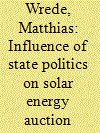

|
|
|
|
|
| Summary/Abstract |
In this paper, we analyze the impact of policy-induced opportunity costs and restrictions on the outcomes of auctions to subsidize ground-mounted photovoltaic (PV) systems in Germany since 2015. First, we examine the incidence of opportunity cost reductions for some suppliers in a simple theoretical auction model. Second, we descriptively study the volumes and prices in PV auctions in Germany. Finally, we analyze a quasi-experiment: the opening of auctions for farmland in disadvantaged areas in some German states from 2017. We show that policy-induced opportunity cost reductions lead to greater success in PV auctions only in the state of Bavaria, which has more generous quantity restrictions and is generally expected to be more supportive of solar power suppliers after 2017. As a result, there is an interregional redistribution in favor of a single state that enables and administratively effectively implements support for disadvantaged areas.
|
|
|
|
|
|
|
|
|
|
|
|
|
|
|
|
| 10 |
ID:
191375
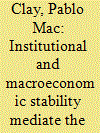

|
|
|
|
|
| Summary/Abstract |
Renewable energy (RE) auctions have become an increasingly popular policy instrument for decarbonizing the global energy matrix, and have been rapidly adopted by several countries worldwide. Previous research has used data from higher-income countries and two-way fixed effects models to estimate the impact of auctions on RE capacity, mostly with favorable results. However, these studies did not account for heterogeneous treatment effects across units to explore whether auctions are also effective in countries with unstable business environments. We analyze whether auctions also foster RE in countries experiencing macroeconomic instability or poor institutional quality. For this purpose, this study has drawn from multiple publicly available databases to build a dataset comprising 98 countries from 2000 to 2020. Our definition of RE includes solar, wind, and biomass sources. We first cluster countries by the quality of their business environment and then perform a differences-in-differences analysis considering staggered treatment adoption. We find that auctions positively affect RE capacity, yet the average treatment effects are higher for countries with better business environments. Thus, governments should exercise caution in adopting this instrument, especially in countries that experience macroeconomic or institutional instability. At the same time, dynamic treatment effects suggest that the policy needs time to show results.
|
|
|
|
|
|
|
|
|
|
|
|
|
|
|
|
| 11 |
ID:
192770
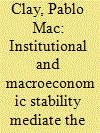

|
|
|
|
|
| Summary/Abstract |
Renewable energy (RE) auctions have become an increasingly popular policy instrument for decarbonizing the global energy matrix, and have been rapidly adopted by several countries worldwide. Previous research has used data from higher-income countries and two-way fixed effects models to estimate the impact of auctions on RE capacity, mostly with favorable results. However, these studies did not account for heterogeneous treatment effects across units to explore whether auctions are also effective in countries with unstable business environments. We analyze whether auctions also foster RE in countries experiencing macroeconomic instability or poor institutional quality. For this purpose, this study has drawn from multiple publicly available databases to build a dataset comprising 98 countries from 2000 to 2020. Our definition of RE includes solar, wind, and biomass sources. We first cluster countries by the quality of their business environment and then perform a differences-in-differences analysis considering staggered treatment adoption. We find that auctions positively affect RE capacity, yet the average treatment effects are higher for countries with better business environments. Thus, governments should exercise caution in adopting this instrument, especially in countries that experience macroeconomic or institutional instability. At the same time, dynamic treatment effects suggest that the policy needs time to show results.
|
|
|
|
|
|
|
|
|
|
|
|
|
|
|
|
| 12 |
ID:
176826


|
|
|
|
|
| Summary/Abstract |
Electricity systems are facing a massive transformation from the replacement of conventional generation technologies by renewables. In this paper, we explore how to make compatible markets principles, economic signals and grid development through the analysis of the grid-related costs associated with the connection of new renewables. Starting from the actual locational patterns of the transmission congestions as baseline, we evaluate the locational impacts, the corresponding network investments and electricity losses associated with the introduction of new renewable (wind and solar) capacity and facing out existent (coal and nuclear) in a real electricity system. Simulated geographical scenarios following the Spanish National Energy and Climate Plan are used to explore up to what extent the potential locations of new generation plants might result in congestions that require relevant grid reinforcements and extra electricity losses, both borne by consumers.
|
|
|
|
|
|
|
|
|
|
|
|
|
|
|
|
| 13 |
ID:
125781


|
|
|
|
|
| Publication |
2013.
|
| Summary/Abstract |
Recent greenhouse gas auctions have resulted in base level prices while remaining significantly concentrated. How do dominant firms receive such a large share of emissions allowances without bidding up the market price? This paper provides a Monte Carlo simulation analysis based on a contemporary regional greenhouse gas market in the United States. It introduces a C# simulation software environment, Oligopsony 1.0 that simulates uniform-price emissions auctions in repeated iterations. The results of these simulations indicate that there can be significant non-linearities between profit and market power as exercised through strategic demand reduction. This analysis finds the optimum point of strategic demand reduction that enables firms to exploit these non-linearities. The use of auctions to distribute tradeable pollution rights to firms in heavily concentrated markets can have significant unintended consequences, as it can exacerbate the problems of market power that exist within those markets.
|
|
|
|
|
|
|
|
|
|
|
|
|
|
|
|
| 14 |
ID:
191329


|
|
|
|
|
| Summary/Abstract |
Rather than by an invisible hand, many industries are kick-started by a government policy. Despite little robust evidence, local content requirements are increasingly used to incentivize domestic manufacturing if imports are cheaper. To examine the effect of local content, we explore an unintended quasi-policy-experiment. Starting in 2013, the Indian government simultaneously held solar auctions with and without local content, providing an otherwise unobserved counterfactual. We digitize the results from the 41 auctions worth 8.65 billion $ in solar module demand and collect annual revenue and solar patents of the 113 participating firms between 2004–2020. For causal identification, we compare winners of local content with similar open auction winners in a staggered difference-in-difference estimation. While we observe an insignificant increase in the same and the following year after firms win LCR auctions, overall, we find winning local content auctions does not significantly increase firms’ solar patents or sales. We identify three reasons why the policy did not create stronger, lasting effects. First, local content did not create sufficient production to enable learning by doing. Second, local content did not generate enough revenue for re-investment into R&D. Third, local content reduced competition in auctions. The analysis underlines the predicament countries face as open auction winners, despite having won 9 times as much capacity, do not patent much (more).
|
|
|
|
|
|
|
|
|
|
|
|
|
|
|
|
| 15 |
ID:
162286


|
|
|
|
|
| Summary/Abstract |
Governments provide various incentives for the production of electricity from renewable energy sources (RES-E). South Korea has promoted the use of such electricity through various programmes, such as Feed-in Tariff from 2002 to 2011, and Renewable Portfolio Standard (RPS) since 2012. The RPS appears to have been particularly effective in stimulating the use of RES-E. However, there remain several issues regarding the current RPS’ policy design. This study examines South Korea's RPS by focusing on two issues. The first issue is the regulation of technology competition under the RPS; and the second issue is risk mitigation, which is generally known as a weakness of the RPS policy.
|
|
|
|
|
|
|
|
|
|
|
|
|
|
|
|
| 16 |
ID:
174970


|
|
|
|
|
| Summary/Abstract |
This paper sheds light on the status quo of currently implemented electricity intraday auctions in Europe and offers an outlook for future developments. First, we compare the two market mechanisms “continuous trading” and “auction” and identify advantages and disadvantages. Then, we investigate the currently existing six intraday auctions in Europe. We compare crucial auction characteristics such as the number of auctions, tradable market period(s), gate opening time and gate closure time, and find a wide variety in auction designs. By examining relevant European regulation and recent regulatory decisions, we illustrate that future European intraday auctions can either be implemented as cross-border auctions or complementary regional auctions. We find that complementary regional auctions of the borders Portugal-Spain, CCR Greece-Italy and CCR Italy-North are already approved.
|
|
|
|
|
|
|
|
|
|
|
|
|
|
|
|
|
|
|
|
|